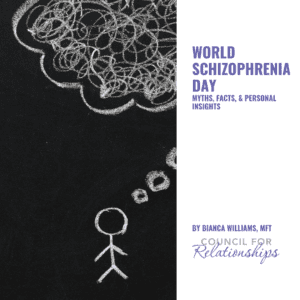World Schizophrenia Day: Myths, Facts, & Personal Insights
Introduction to World Schizophrenia Day
World Schizophrenia Day, observed annually on May 24th, aims to raise awareness about Schizophrenia, a serious mental illness that affects millions of people worldwide. This day is dedicated to debunking myths and reducing the stigma associated with the disorder, fostering greater understanding and empathy within communities. On this day, mental health professionals, advocates, and individuals affected by Schizophrenia come together to share their stories and insights.
In this blog, Bianca Williams, MFT, a staff therapist at the Council for Relationships, offers a personal and professional perspective on living with Schizophrenia. She highlights the importance of compassion, accurate information, and support for those affected by the disorder. Through her narrative, readers are invited to gain a deeper understanding of Schizophrenia, challenge common misconceptions, and learn practical tips for supporting individuals with this condition.
By increasing schizophrenia awareness and knowledge, World Schizophrenia Day seeks to create a more inclusive and supportive environment for everyone impacted by mental health challenges and to promote overall mental health awareness.
 Personal Story and Purpose
Personal Story and Purpose
On this World Schizophrenia Day, I want to share a deeply personal story about a loved one living with Schizophrenia. This is not just a tale of struggle but a call to spread awareness and compassion. Not from the personal vantage point you might have suspected but more so from the lens of someone as dear to me as air and water. This person that I speak of has been diagnosed with severe Schizophrenia for a number of years. Although writing this out is rather uncomfortable for me, it pales compared to hearing it from a doctor.
Understanding Schizophrenia
Definition and Symptoms
There are over seventy disorders known to be listed in the DSM-5. For those who either need a refresher or at one time thought like me, “Aren’t they all kinda the same thing,” I will break it down a bit.
Schizophrenia is a serious mental illness that can affect thinking, perception, and behavior. A central feature of Schizophrenia is psychosis, which includes hallucinations and delusions.
Common Myths
Unfortunately, as with many occurrences in society, myths have been conjured up and associations made about the disease, the most popular being that of having split personalities. These schizophrenia myths are completely untrue. Individuals with Schizophrenia have one personality, just like everyone else. However, in these individuals, certain chemicals in specific areas of the brain are out of balance, which causes a lack of coordination between thoughts, actions, and emotions.
Historical Context
The term ‘Schizophrenia’ literally means “a splitting of the mind” and was coined in 1910 by Swiss psychiatrist Dr. Paul Eugen Bleuler.
Over time, the illness began to gain more focus, and the National Schizophrenia Foundation declared May 24th as World Schizophrenia Day. This day was meant to honor Dr. Philippe Pinel from France, a major figure in the early efforts to provide humane care and treatment for the mentally ill. According to the World Health Organization, the illness affects over 22 million people worldwide.
Importance of World Schizophrenia Day
What makes this day so important is to spread not only awareness about this illness but also to eradicate the myths and superstitions around mental illnesses in general. As a fellow human, I can attest that, often, when we are afraid or unsure of something, our natural instinct is to back away from it.
Yes, it is true that symptoms associated with this illness are scary, upsetting, and downright uncomfortable to watch, but imagine for a second what it is like for the other person. Now imagine it is an individual you care about, perhaps even more than you care for yourself.
Personal Reflections and Empathy
Schizophrenia is a spectrum disorder, and like other psychotic disorders, it is defined by abnormalities in one or more domains. For example, avolition is one of many “negative symptoms” associated with Schizophrenia. This is when the individual experiences a decreased motivation for purposeful activities and instead can sit for extremely long periods, unable to work or enjoy any social engagement.
The distinctions made within these disorders are just as crucial as taking extensive medical histories to avoid misdiagnosing. Schizophrenia treatment methods like medications and Electroconvulsive Therapy (that is, sending electrical currents through the brain) are constantly changing, and their benefits are studied to provide the best outcomes, as every person’s story and symptoms are different.
I know from witnessing another’s journey firsthand how challenging treating this illness can be. Whether the cause is physiological, genetic, or the psychosis is exacerbated in some way by the environment, I hope that reading this will instill empathy and insight in others.

Infographic by Council for Relationships
Tips for Better Understanding Schizophrenia
- Replace Fear with Compassion: Try replacing feelings of fear or negativity with compassion and empathy. Sadly, we walk alongside many of these individuals daily who have nowhere to go and are left untreated.
- Avoid Assumptions and Judgments: Try to avoid making assumptions or judgments. More than likely, the person under less stressful circumstances (and medicated) knows they are unwell; this illness can cause more emotional turmoil for the individual than you know.
- Educate Yourself: When in doubt, read about it. Educating yourself on the many ways this illness shows up and can affect a person can keep one from labeling and diminishing, which is harmful on a whole other level.
Conclusion
By sharing my story on World Schizophrenia Day, I hope to foster empathy and understanding for those living with this challenging illness. Remember, education and compassion can help break down the stigma surrounding mental health.
If you are reading this and you have been diagnosed with Schizophrenia, please know that the space you take up is just as important and meaningful as anyone else. Although what you carry alongside you may be extraordinarily heavy, know that there will always be people who truly care and that you yourself will never be the problem.
 About Philadelphia Marriage & Family Therapist Bianca Williams
About Philadelphia Marriage & Family Therapist Bianca Williams
Bianca Williams, MFT, is a Staff Therapist at the Council for Relationships who sees individuals, couples, and families in Philadelphia and online. Contact her to book an appointment.
Let CFR’s over 85 individual, couples, and family therapy experts help you build thriving relationships and flourishing communities. See our Therapist & Psychiatrist Directory for CFR therapists or psychiatrists near you.
If this is an emergency, please call 911 or contact the National Suicide Prevention Lifeline by dialing 988.
More Mental Health Blogs from CFR
CFR expert therapists, psychologists, and psychiatrists offer much more to explore! Check out the CFR Expert Voices blog for great mental and emotional health advice and insight. To get first access to our Expert Voices blog, join our mailing list!
Taylor Swift Songs about Mental Health: The Self-Titled Edition
